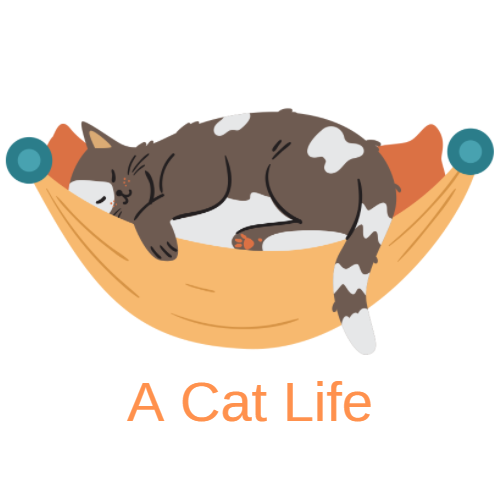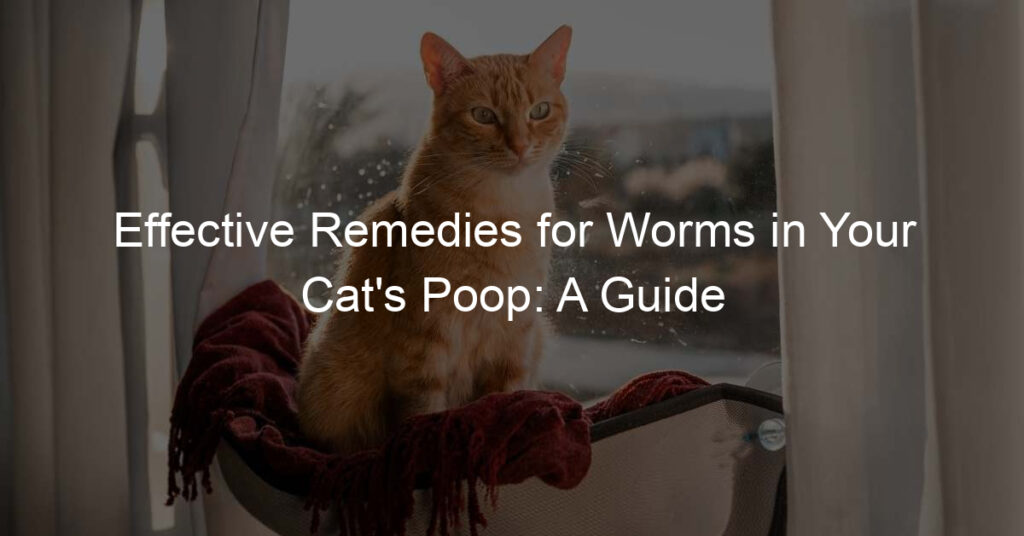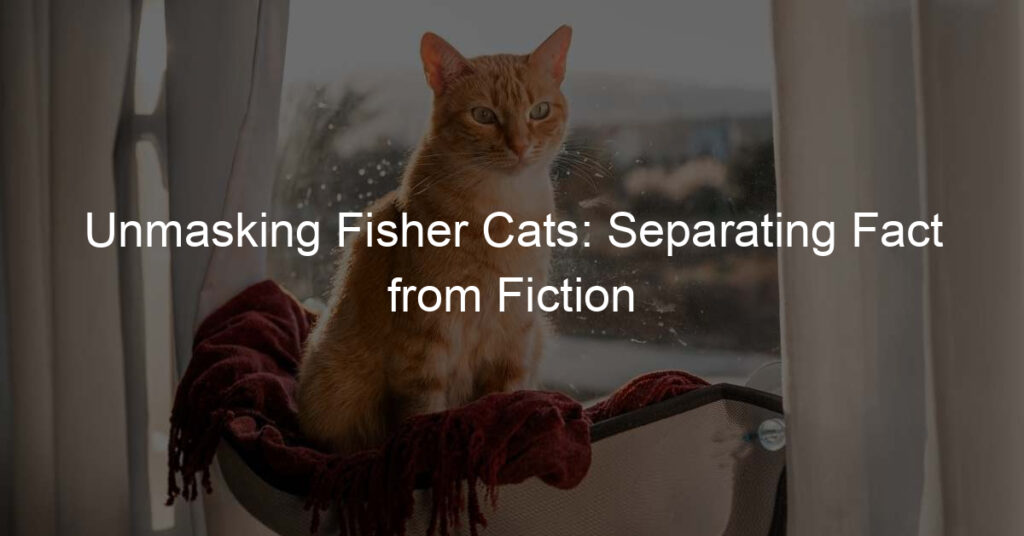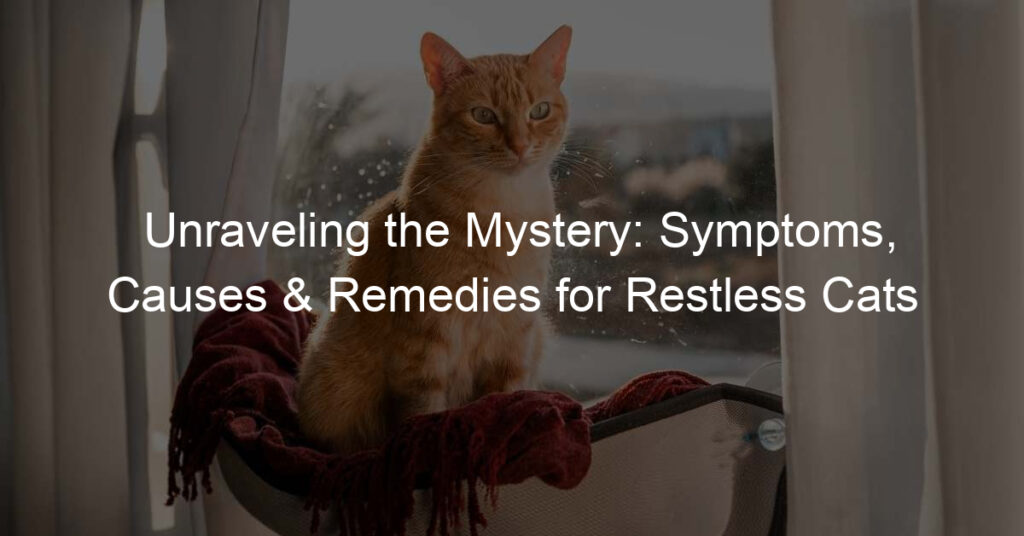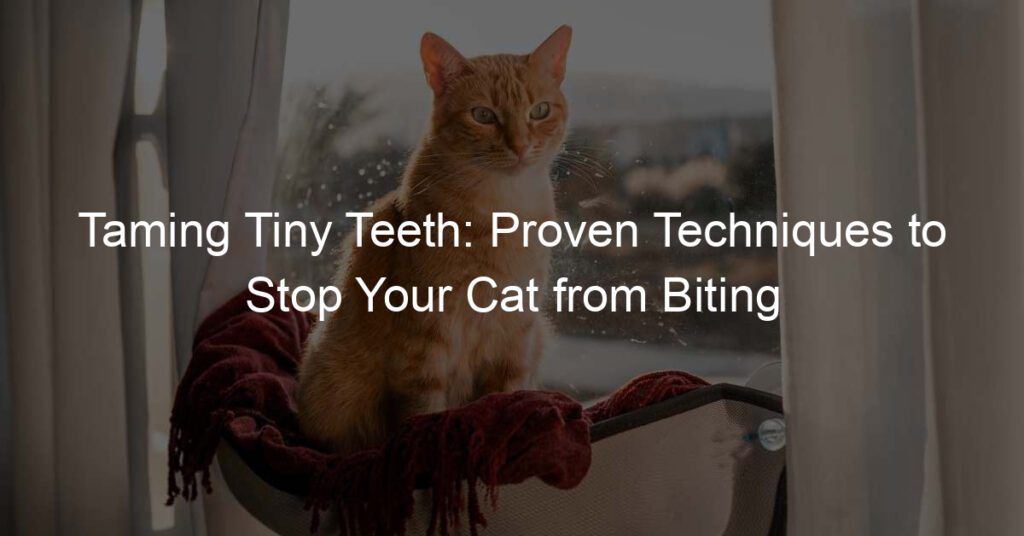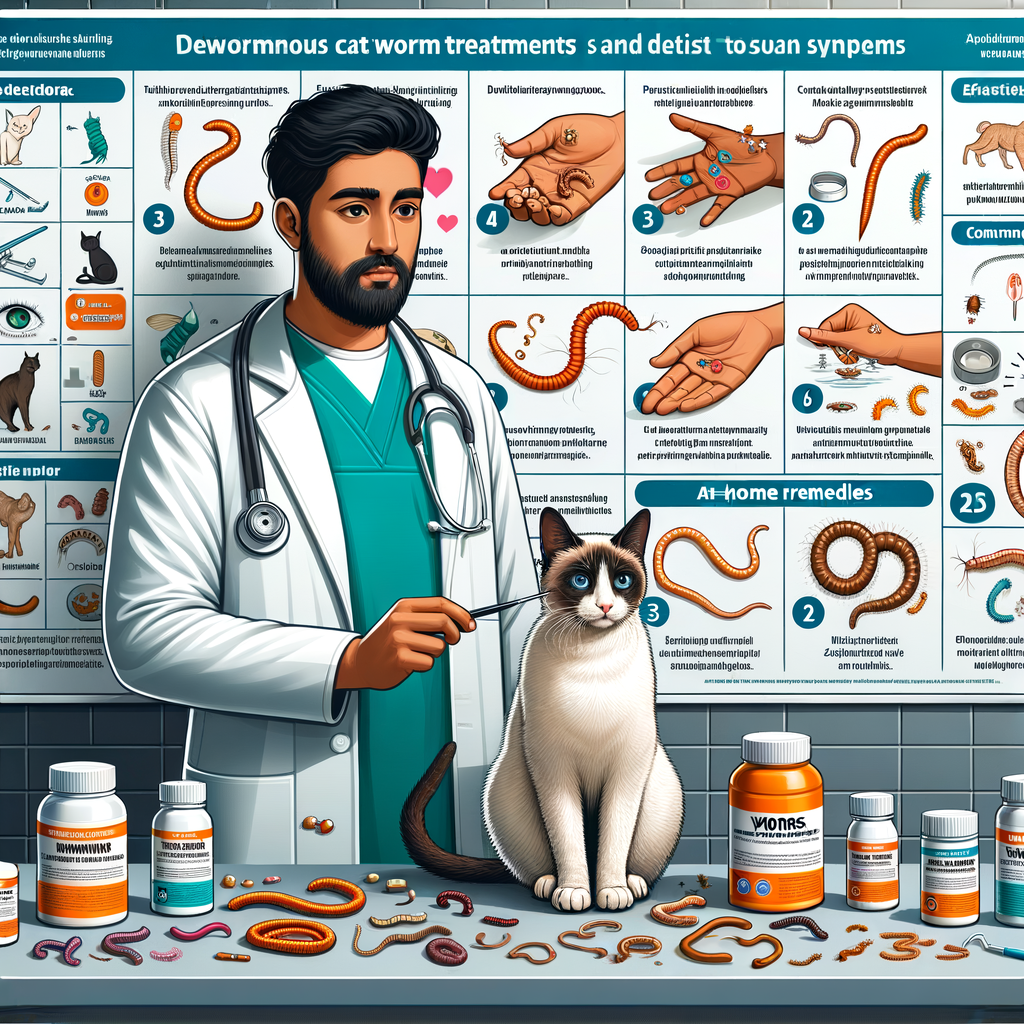
Introduction to Cat Worm Treatment
Worms in cats are a common health problem that every cat owner should be aware of. They can cause a variety of health issues, from mild discomfort to serious illness. In this section, we will discuss the importance of treating worms in cats and give an overview of the common types of worms that can affect our feline friends.
- Understanding the importance of treating worms in cats
- Overview of common types of worms in cats
Worms are parasites that can live inside your cat’s body, feeding off their nutrients and causing a range of health problems. If left untreated, worms can lead to weight loss, poor coat condition, and even severe anemia in cats. In worst-case scenarios, they can cause blockages in the intestines, which can be fatal. Therefore, it is crucial to treat worms in cats promptly and effectively.
There are several types of worms that can infect cats. The most common ones are roundworms, tapeworms, and hookworms. Roundworms are the most prevalent, and they can grow up to four inches long. They live in the cat’s intestines and feed off the food the cat eats. Tapeworms, on the other hand, are flat and segmented, and they attach themselves to the cat’s intestines. Hookworms are smaller and less common, but they can be very harmful as they feed on the cat’s blood. Each type of worm requires a different treatment, so it’s important to get your cat checked by a vet if you suspect a worm infection.
In the following sections, we will delve deeper into the symptoms of worms in cats, the different types of worms, deworming methods, and prevention strategies. We will also share some case studies to provide real-life examples of treating worms in cats. Stay tuned to learn more about this important aspect of cat health.
Symptoms of Worms in Cats
It is crucial for cat owners to be aware of the symptoms of worms in cats. Early detection can lead to more effective treatment and prevent further health complications. Here are some signs to look out for:
- Recognizing the signs of worms in cat feces
- Other health symptoms associated with worms in cats
- Weight loss: Despite eating normally, your cat may start losing weight rapidly. This is because worms consume the nutrients from the cat’s food, leaving the cat malnourished.
- Vomiting: Cats with worms often vomit. Sometimes, you may even see worms in the vomit.
- Dull coat: A healthy cat usually has a shiny coat. If your cat has worms, their coat may appear dull and lifeless.
- Increased appetite: If your cat is always hungry, it could be a sign of worms. The worms are consuming the nutrients from the cat’s food, making the cat feel constantly hungry.
One of the most common signs of worms in cats is the presence of worms in their feces. These may appear as small, white segments similar to grains of rice. In some cases, the worms may not be visible to the naked eye, but the cat’s feces may be softer than usual or may contain blood. It’s important to regularly check your cat’s litter box for any unusual changes.
Aside from changes in feces, there are other health symptoms that may indicate a worm infestation in cats. These include:
Remember, these symptoms may also be signs of other health issues. It’s always best to consult with a veterinarian if you notice any changes in your cat’s behavior or appearance. Early detection and treatment are key to keeping your furry friend healthy and happy.
Types of Worms in Cats
There are various types of worms that can infect our feline friends. Understanding these types can help us better protect our cats and ensure their health. Here are the most common types:
- Roundworms
- Tapeworms
- Hookworms
- Heartworms
Roundworms are the most common type of worms in cats. They are long, spaghetti-like parasites that live in the cat’s intestines. Kittens can get roundworms from their mother’s milk, while adult cats can get them from infected rodents or contaminated soil. Infected cats may have a pot-bellied appearance and may suffer from weight loss and vomiting.
Tapeworms are flat, segmented worms that attach themselves to the cat’s intestines. Cats can get tapeworms from eating infected fleas or rodents. Infected cats may lose weight and may have visible segments of the worm in their feces or around their rear end.
Hookworms are small, thin worms that attach to the wall of the small intestine and suck blood. Cats can get hookworms from contaminated soil or from eating infected rodents. Infected cats may have diarrhea, weight loss, and anemia.
Heartworms are a serious and potentially fatal type of worm that live in the heart and blood vessels of the lungs. Cats can get heartworms from the bite of an infected mosquito. Infected cats may have coughing, difficulty breathing, and sudden death.
It’s important to remember that each type of worm requires a different treatment, so it’s crucial to get a correct diagnosis from a vet. Regular deworming can help prevent these infections.
Cat Deworming Methods
When it comes to the health of our feline friends, deworming is a crucial step. This process helps eliminate harmful parasites that may be living inside your cat’s body. Let’s delve into one of the most effective methods – professional cat worm treatment.
Professional Cat Worm Treatment
Professional cat worm treatment is a method that involves the expertise of a qualified veterinarian. This approach ensures that your cat receives the most suitable treatment based on their specific needs and health condition.
- Understanding the process of professional deworming
- Benefits and drawbacks of professional treatment
Professional deworming starts with a thorough examination of your cat. The vet may take a stool sample to identify the type of worms affecting your cat. Based on the results, they will prescribe the most effective deworming medication. The treatment may involve a single dose or a series of doses over a few weeks. Remember, it’s important to follow the vet’s instructions closely to ensure the best outcome for your cat.
The main benefit of professional treatment is that it’s tailored to your cat’s specific needs. The vet will consider factors like your cat’s age, health status, and the type of worms they have. This personalized approach increases the chances of successful treatment.
Another advantage is the ongoing support and advice you’ll receive from the vet. They can provide tips on preventing future worm infestations and monitor your cat’s progress throughout the treatment.
However, professional treatment can be more expensive than over-the-counter deworming products. It also requires more time and effort as you’ll need to schedule and attend vet appointments.
In conclusion, professional cat worm treatment is a reliable and effective method of deworming. While it may require more resources, the benefits it offers in terms of personalized care and ongoing support make it a worthwhile investment for your cat’s health.
Home Remedies for Worms in Cats
While professional treatments are often the most effective, there are also various home remedies that can help treat worms in cats. These remedies are natural, affordable, and can be easily administered at home. However, it’s important to remember that these remedies should only be used as a supplement to professional treatments, not as a replacement.
- Effective natural remedies for cat worm treatment
- Pumpkin seeds: Rich in an amino acid called cucurbitacin, pumpkin seeds can paralyze worms, making them lose their grip on the cat’s intestines and get expelled through feces.
- Carrots: Carrots are known to scrub the walls of the cat’s intestines, removing the worms present.
- Apple cider vinegar: Adding a small amount of apple cider vinegar to your cat’s water can create an inhospitable environment for worms.
- Precautions when using home remedies
- Consult a vet: Before starting any home remedy, always consult with a vet. They can guide you on the right dosage and method of administration.
- Monitor your cat’s reaction: Keep a close eye on your cat’s reaction to the remedy. If you notice any adverse effects, stop the treatment immediately and consult a vet.
- Do not delay professional treatment: If your cat has worms, it’s important to seek professional treatment as soon as possible. Home remedies should only be used as a supplement, not a replacement for professional treatment.
There are several natural remedies that can help in treating worms in cats. These include:
Remember, these remedies may help, but they should not replace a visit to the vet.
While home remedies can be helpful, it’s important to take certain precautions:
Cat Worm Medication
Worms in cats can be a serious issue. Thankfully, there are numerous cat worm medications available to help your feline friend. In this section, we will discuss the common types of cat worm medications, how to administer them, and potential side effects.
- Overview of common cat worm medications
- Pyrantel Pamoate: This is a common medication used to treat roundworms and hookworms in cats.
- Praziquantel: This medication is used to treat tapeworms in cats.
- Fenbendazole: This is a broad-spectrum wormer that can treat a variety of worms in cats, including roundworms, hookworms, and whipworms.
- How to administer cat worm medication
- Read the instructions on the medication package carefully.
- Measure the correct dosage based on your cat’s weight.
- Some medications can be mixed with food, while others need to be given directly into the cat’s mouth.
- Monitor your cat after administering the medication to ensure they don’t vomit or have any adverse reactions.
- Possible side effects of cat worm medication
- Vomiting or diarrhea
- Lack of appetite
- Lethargy or tiredness
- Itching or skin irritation
There are several types of cat worm medications available on the market. These include:
It’s important to consult with your vet before starting any medication regimen, as the type of medication needed will depend on the type of worm your cat has.
Administering cat worm medication can be a challenge, but with a little patience and the right approach, it can be done. Here are some steps to follow:
Like any medication, cat worm medication can have side effects. These may include:
If your cat shows any of these signs after taking worm medication, it’s important to contact your vet immediately.
In conclusion, cat worm medication is a crucial part of maintaining your cat’s health. Always consult with your vet before starting any new medication, and monitor your cat closely for any potential side effects.
Prevention of Worms in Cats
Preventing worms in cats is a crucial aspect of maintaining their overall health. By following proper hygiene practices and ensuring regular vet check-ups, you can significantly reduce the risk of worm infestation in your feline friends. Let’s delve into these preventive measures in detail.
- Proper Hygiene Practices for Prevention
- Importance of Regular Vet Check-ups
Good hygiene is the first line of defense against worms in cats. It’s important to keep your cat’s living area clean and tidy. Regularly clean and disinfect your cat’s litter box to prevent the spread of worm eggs. Always wash your hands after handling your cat’s waste or cleaning their litter box.
Moreover, try to prevent your cat from hunting and eating small animals like birds or rodents, as these can be carriers of worms. If your cat is an outdoor cat, monitor their activities as much as possible to limit their exposure to potential sources of infection.
Regular vet check-ups are another essential aspect of preventing worms in cats. Even with the best hygiene practices, cats can still get worms. Therefore, it’s important to have your cat examined by a vet regularly.
During these check-ups, the vet can perform fecal tests to detect the presence of worm eggs. If any worms are detected, the vet can prescribe appropriate deworming medication. Regular vet visits also allow for early detection and treatment of worms, preventing serious health issues in your cat.
In conclusion, prevention of worms in cats is a two-fold process that involves maintaining proper hygiene and ensuring regular vet check-ups. By following these practices, you can help keep your cat healthy and worm-free.
Case Studies: Treating Worms in Cats
Let’s take a closer look at some real-life examples of cats that have been successfully treated for worms. These case studies will provide you with a better understanding of how worms can affect cats and how they can be effectively treated and prevented.
- Case Study 1: Successful treatment of roundworms
- Case Study 2: Overcoming a severe tapeworm infestation
- Case Study 3: Preventing recurrence of worms in cats
Fluffy, a 2-year-old domestic shorthair, was brought to the vet with a bloated belly and a lack of appetite. After a fecal examination, she was diagnosed with a roundworm infestation. Fluffy was prescribed a deworming medication, which she took orally for two weeks. Her owner also ensured that she was kept indoors to prevent re-infestation. Within a month, Fluffy’s symptoms had completely disappeared, and a follow-up fecal test confirmed that the roundworms were gone.
Max, a 4-year-old Maine Coon, was losing weight rapidly despite having a good appetite. His owner noticed small, rice-like segments in his feces and took him to the vet. Max was diagnosed with a severe tapeworm infestation. He was given a series of injections over a period of three weeks to kill the tapeworms. His owner also treated him for fleas, a common source of tapeworms in cats. Max’s weight stabilized, and he returned to his playful self within a few weeks.
Molly, a 3-year-old Siamese, had been treated for worms several times in her short life. Her owner was frustrated and wanted to prevent future infestations. The vet recommended a monthly preventative treatment, which Molly took orally. Her owner also made sure to keep her living environment clean and free of fleas. Since starting the preventative treatment, Molly has remained worm-free for over a year.
These case studies illustrate the importance of early detection, effective treatment, and preventative measures in managing worm infestations in cats. Remember, a healthy cat is a happy cat!
Conclusion: Cat Health and Worms
In this article, we have explored the importance of understanding the signs, types, and treatments of worms in cats. It’s crucial to maintain our feline friends’ health and ensure they live a long, happy life. Let’s summarize the key takeaways and our final thoughts on maintaining your cat’s health.
- Summary of key takeaways for cat worm treatment
- Final thoughts on maintaining your cat’s health
Firstly, being aware of the symptoms of worms in cats is essential. These can include weight loss, dull coat, and changes in appetite. Secondly, there are several types of worms that can affect cats, such as roundworms, tapeworms, and hookworms. Each requires a different treatment approach.
Deworming methods for cats can vary, but they often involve oral medication. It’s important to consult with a vet to determine the best treatment for your cat. Preventing worms is also crucial and can be achieved through regular vet check-ups, maintaining a clean environment, and using preventative medications.
Finally, we’ve looked at several case studies that illustrate successful treatment of worms in cats. These examples highlight the importance of early detection and treatment.
Keeping your cat healthy involves more than just treating worms. It’s about providing a balanced diet, ensuring they get regular exercise, and scheduling regular vet visits. Remember, a healthy cat is a happy cat.
By understanding the risks of worms and taking proactive steps to prevent them, you’re doing your part to ensure your cat’s health and longevity. It’s our responsibility as pet owners to provide the best care possible for our feline friends.
In conclusion, cat health and worms are interconnected. By staying informed and taking the necessary precautions, we can help our cats live a worm-free, healthy life. Remember, when it comes to your cat’s health, prevention is always better than cure.
